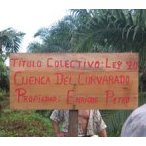
7 November 2011 | Interviews | Forests and biodiversity | Human rights
Appropriating Violence
Agrofuels displace peasants and cause food crisis in the north of Colombia
Download: MP3 (1.1 Mb)
As part of the 2nd Public Forum: Agrofuels in Colombia, called by social and non governmental organizations as the second part of the International Verification Mission that toured around five regions in July of 2009, we interviewed Priest Luis Carlos Inojosa, who tells us about the terrible consequences that agrofuels have on the communities’ human rights and access to food.
The Forum took place at the University of Bogota on Friday 4 November in order to raise awareness about the conflicts and impacts suffered by local communities as a result of agrofuel projects.
The presentations talked about increasing human rights violations, which already in 2009 had been verified by the International Mission, where Real World Radio participated.
The Forum was called by organizations such as: Proceso de Comunidades Negras (PCN), Interecclesiastic Justice and Peace Commission, Colombia’s National Indigenous Organization (ONIC), members of Vía Campesina Colombia, Censat Agua Viva – Friends of the Earth Colombia, Grupo Semillas and Fundación Compromiso.
In interview with Real World Radio, Inojosa spoke about the consequences of palm oil expansion for biodiesel production promoted by the Colombian government a decade ago especially in the region of Bajo Atrato in the border with Panama.
This land is as rich in biodiversity as the Amazon since they are part of the same bio-geographical region of the tropical wet rainforest, which implied a recognition as Forestry Reserve in 1957 because of its huge and endemic biodiversity.
From 1997 to 2001 the population of this region suffered from military operations and illegal paramilitary forces, which under the excuse of fighting the guerrillas, displaced African-descendent, indigenous and mestizo communities.
This caused great part of the territory legally recognized as collective property to be illegally expropriated. As a result of this expropriation there have been over 140 crimes against humanity in this area and fifteen massive forced displacements, Diego Rodriguez of CENSAT told Real World Radio.
In response to this, the communities have created Humanitarian Zones as a strategy to remain in their territories and to protect their rights.
Photo: contagioradio.com







